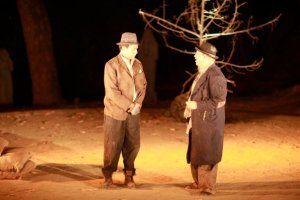That’s the translation of the title of a remarkable two-page interview with Stefaan Vaes in De Standaard, one of the main Flemish dailies. The 39-year old Vaes, a former colleague of mine in Paris and now a professor in Leuven, has already been quoted here on the occasion of receiving the Francqui Prize, telling Belgian Queen Mathilde that he does mathematics because he likes it. Yesterday I had noticed a huge spike in visits to this blog from Belgium, and an equivalent spike in referrals from Google. The explanation was in the first line of the interview:
In het boek Mathematics without apologies, een soort survivalgids voor de wiskundige, stootte professor Stefaan Vaes (39) van de KU Leuven op een ludiek hoofdstuk ‘How to explain number theory at a dinner party?’
Online translators render this accurately enough:
In the book Mathematics without apologies, a kind of survival guide for the mathematician, bumped Professor Stefaan Vaes (39) of the KU Leuven in an entertaining chapter ‘How to explain number theory at a dinner party?”
De Standaard is running a series of five long interviews with young scientists this week, an admirable effort to get beyond clichés. I don’t think I have ever seen a mathematician, not even Cédric Villani, given so much space in a major daily paper to explain the reality of our vocation (unapologetically, it goes without saying). The interview is, of course, in Dutch, and all but the first 73 words are behind a paywall. If you are at a university your library may have a subscription. Mine does, but it’s not handy for cutting and pasting into an online translator. Fortunately, Stefaan sent me a pdf version of the article, and here are a few choice excerpts, which I will let you translate.
Here he confirms what he told the Queen:
Uiteindelijk was de clou van mijn speech dat ik dit doe omdat ik het graag doe. Mijn onderzoeksgroep doet aan puur fundamenteel onderzoek, zonder oog op een praktische of economische toepassing. Wat ons drijft, is het zuivere verlangen om te weten.
When the interviewer suggests that the motivation of the pure mathematician is the search for beauty, he demurs:
Maar ik zou niet over schoonheid spreken. Het is vooral de ervaring hoe een nieuw idee of inzicht de compleet duistere toestand opheldert. Als of je in een donkere ruimte plots de schakelaar vindt en alles klaar wordt.’
We also learn that he was inspired to study mathematics by two “fantastic” high school teachers, and that, among the characters of world literature, he would prefer to have Vladimir from Waiting for Godot (pictured above) in his research group, because
Er is heel veel geduld en doorzettingsvermogen nodig om een doorbraak in de wiskunde te forceren.’

